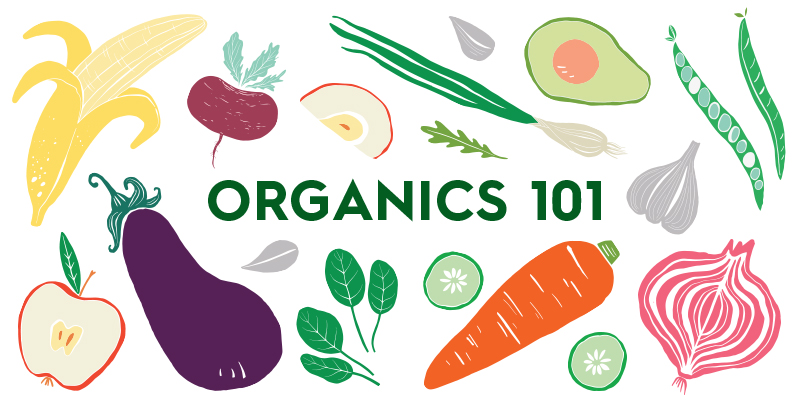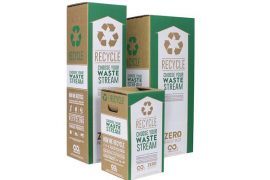By Julia Richards
April is Earth Month and one way to show our land and bodies some love is to try to eat more organic produce. Organic agriculture reduces the amount of toxic chemicals contaminating our land and water, protects pollinators and farm workers, and even fights climate change by sequestering more carbon than conventional agriculture.
Want to check your organic IQ? Test your chops with our quiz below. Megan Minnick, purchasing director and produce category manager at Willy Street Co-op, helped us sort out the answers. Last year, 95% of produce sold at the Co-op, which has locations on the east and north side of Madison, as well as Middleton, was certified organic.
Q: Certified organic foods are all genetically modified organism (GMO)-free: T or F?
A: TRUE. Part of those organic standards is prohibiting genetically modified organisms. There’s a lot of controversy around whether GMOs are a health concern or not, says Minnick, but the Co-op’s stance has been that they should be labeled so consumers can make an informed choice. So when you see the certified organic label you also know the item doesn’t have GMOs.
Q: Organic foods are grown without any synthetic pesticides or fertilizers: T or F?
A: TRUE. To be certified organic, foods can’t be treated with manmade pesticides or fertilizers, which are often derivatives of petroleum products, explains Minnick. That doesn’t mean organic crops can’t have any pesticides or fertilizers though, just that these have to come from natural sources.
Q: Organic produce is more expensive than conventional produce: T or F?
A: NOT NECESSARILY. “At this point in time, I would say it’s a lot less of a difference than most people think,” Minnick says. “We carry a pretty full line of conventional produce at our north side store alongside the organic, and I do our pricing week after week. … For some products there can be a big difference. But sometimes, honestly, we’ve seen times when the conventional is actually more expensive than the organic. It’s all based on supply and demand. … The pricing this morning for example, for conventional cauliflower and broccoli is nearly exactly the same price [as for organic].” Organic dairy, meat and eggs tend to be a little more expensive because “some of the organic rules about livestock have to do with the amount of space that they have, their access to the outdoors, that kind of thing, which is just more expensive than keeping cattle or chickens really confined in a feed lot,” Minnick explains.
Q: Organic foods are more nutritious: T or F?
A: NOT NECESSARILY. Studies haven’t found much of a difference in nutrient levels in organic versus conventional produce, Minnick says. One exception might be organic meats, eggs and dairy. “Organic beef has to have some access to pasture. So by eating that grass, they’re actually getting more nutrients into that beef that people can take advantage of,” Minnick says. Eating organic also definitely reduces people’s exposure to those chemical pesticides, she adds.
Q: Animals used to produce organic meat, dairy and eggs are allowed to have which of the following?
A. Antibiotics
B. Animal byproducts
C. Growth hormones
D. None of the above.
A: D. Animals producing organic meat, dairy or eggs cannot be treated with antibiotics or growth hormones and cannot be fed animal byproducts.
Q: Apples and eggplants will have the same pesticide residue on them unless they’re organic: T or F?
A: FALSE. Some crops tend to have much more pesticide use than others. Apples have one of the highest rates of pesticide use, while eggplant have one of the lowest. If people want to reduce their pesticide exposure, they can prioritize buying certain foods organic. The Environmental Working Group has lists of produce with the highest and lowest amounts of pesticide use.
(See Prioritizing What to Buy Organic).
Farmer Direct
The Dane County Farmers’ Market would normally return to the Capitol Square this month. Among the local offerings of fruits, vegetables, meats, eggs and cheeses are over two dozen farms that are certified organic, according to market manager Sarah Elliott. Many more use organic methods but haven’t gone through the paperwork-intensive certification process.
When buying directly from the farmer who grew the produce customers can always ask about pesticide use or other concerns. “One of the main benefits of being a producer-only farmers market is that the farmer is literally the person behind the stand,” Elliott says. “We wholeheartedly encourage our farmers to have conversations with their customers about their growing practices and why they make the growing choices they do.”
Prioritizing What to Buy Organic
The Environmental Working Group issues lists of the produce grown with the most and least pesticides:
Dirty Dozen
- Strawberries
- Spinach
- Kale
- Nectarines
- Apples
- Grapes
- Peaches
- Cherries
- Pears
- Tomatoes
- Celery
- Potatoes
Clean 15
- Avocados
- Sweet corn
- Pineapples
- Sweet peas (frozen)
- Onions
- Papayas
- Eggplants
- Asparagus
- Kiwis
- Cabbage
- Cauliflower
- Cantaloupe
- Broccoli
- Mushrooms
- Honeydew melon





Comments are closed.